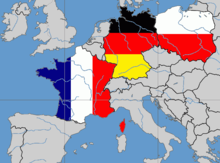Weimar Triangle 2005
The 6th meeting of the Weimar Triangle took place on May 19, 2005 in Nancy , France . The meeting in Nancy coincided with the celebrations for the 250th anniversary of the establishment of Place Stanislas by the former King of Poland and later Duke of Lorraine Stanislaus I. Leszczyński . It was the first meeting of the forum after Poland joined the EU and the second meeting of the Weimar Triangle in Nancy.
Attendees
The French President Jacques Chirac , the Polish President Aleksander Kwaśniewski and the German Chancellor Gerhard Schröder were present .
subjects
A central theme of the meeting was the upcoming French referendum on May 29, 2005 on the European Constitution . The agreed topics of this summit were the consequences of the EU enlargement in 2004 , the EU internal policy and the EU neighborhood policy in connection with the Eastern European countries. Other topics of the meeting were relations between Russia and the European Union , relations between Ukraine and the EU, the situation in the Middle East and Iraq and the preparation of the 60th General Assembly of the United Nations .
The expansion of the trilateral partnership in business, trade, education and training as well as intercultural exchange was also discussed.
EU budget
The heads of government also discussed the EU's draft budget during the meeting. France and Germany emphasized their demand that the contributions of the member states to the EU budget be limited to 1.0% of their gross national income . An agreement was not reached on all points on the budget issue, but an understanding was reached on:
- the requirement to comply with budget discipline
- the demand for special solidarity towards the economically weak new EU member states
- calling for a review of the UK's special treatment in the form of a discount
Neighborhood policy
Polish President Kwasniewski spoke out in favor of a special solidarity with the economically weak new EU member states. For his country, he called for financial aid "at least at the level of Spain" because both countries are comparable in terms of size.
Chirac and Schröder supported the principle of special solidarity for the new EU members, but emphasized that those countries which had previously benefited from the solidarity of the other must now also be ready to show solidarity with the new states. Gerhard Schröder explained: "Just saddle up to be able to satisfy all wishes, nobody in Europe can do that."
Trilateral partnership
At this meeting, too, the participants emphasized the importance of the forum. Jacques Chirac explained: "In our talks [...] we once again underlined the importance of the regular meetings of the Weimar Triangle, in order to discuss the trilateral problems together, but also to talk about problems of a general nature that are pending in Europe concerning European integration. " Aleksander Kwasniewski reiterated: "This institution [the Weimar Triangle] is very important from a Polish point of view. It has played an essential role for us on the way to the European Union - and before that to NATO . I express my hope that this initiative will continue and there will be more meetings. Others will take part. But for my part I would like to express my satisfaction that I was always happy to be there. " Gerhard Schröder concluded: "Indeed, we conducted the talks in a very European spirit. This was possible because we are not only formally European, but also because we have a lot in common in terms of content."
Individual evidence
- ↑ Official encounters. weimarer-dreieck.eu, accessed on March 10, 2017 .
- ↑ a b c d e The 'Weimar Summit' in Nancy: A critical assessment. weimarer-dreieck.eu, accessed on March 10, 2017 .
- ↑ a b Summit encounters in the Weimar Triangle. weimarer-dreieck.eu, accessed on March 10, 2017 .
